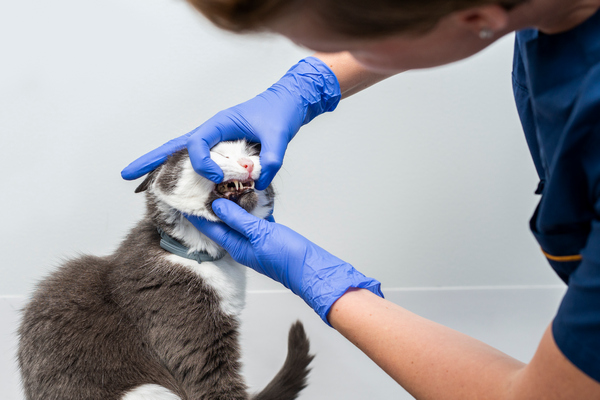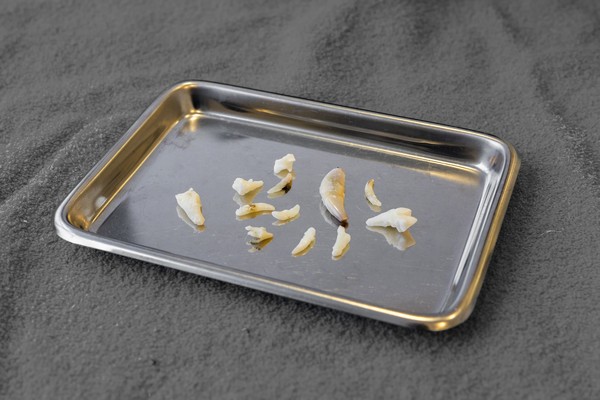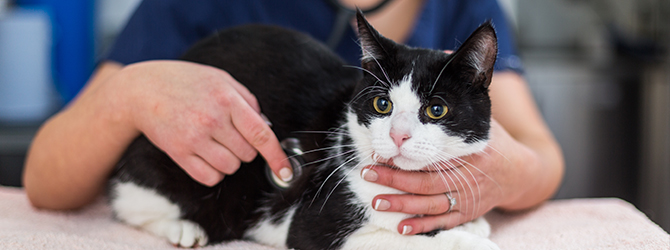Stomatitis in cats: what is feline stomatitis and could your cat be at risk?
Cat stomatitis (also called feline stomatitis or chronic gingivostomatitis), is a serious and painful condition causing inflammation of a cat's mouth and gums. Studies show that it affects up to 26% of cats but 70% to 80% of cats experience significant improvement of symptoms following dental extractions.
If you've noticed your cat having difficulty eating or showing signs of discomfort in their mouth, it could be feline stomatitis. The condition is often linked to long-term viral infections and is seven times more common in multicat households.
Taking your cat to the vet regularly and catching any dental issues early is important to help manage their pain and improve their quality of life.
What is feline stomatitis?
This condition commonly affects the gums, the back of the mouth, the insides of the lips, and occasionally the tongue. It causes severe pain and can greatly impact a cat's quality of life.
Stomatitis can occur in any breed and at any age, although pedigrees are more prone to it. The exact cause of feline stomatitis is not fully understood, but it’s believed to be an abnormal reaction of the immune system to plaque and bacteria in the mouth.
Symptoms of feline stomatitis
Cats are masters at hiding pain, so spotting signs of stomatitis can be tricky. Here are some symptoms to watch out for:
- Difficulty eating
- Cats with stomatitis often eat less or refuse food altogether. You might notice them dropping food, chewing gingerly, or favouring one side of their mouth.
- Weight loss
- Because eating is painful, your cat may lose weight over time.
- Bad breath
- Halitosis, or bad breath, is a common sign of dental issues, including stomatitis.
- Drooling
If your cat has stomatitis, they might drool a lot and their saliva could look a little pink or brown because it contains blood.
Pawing at the mouth
If your cat frequently paws at their mouth or face, it could indicate discomfort or pain.
Swollen or bleeding gums
Upon examining your cat’s mouth, you might see red, swollen, or bleeding areas on the gums or at the back of the mouth.
Behavioural changes
Because your cat is in pain, they may become more irritable, withdrawn, or less active.
Causes of feline stomatitis
The exact cause of feline stomatitis is not entirely understood, but several factors are believed to contribute to its development. These include:
Immune system dysfunction
Stomatitis is mainly caused by your cat’s immune system overreacting to bacteria in the mouth. Instead of attacking only harmful bacteria, the immune system becomes overly active, leading to widespread inflammation.
Dental disease
Poor dental hygiene and the presence of dental plaque and tartar can contribute to stomatitis. Bacteria from dental disease can irritate the gums and trigger the immune response.
Viruses
Certain viruses, such as feline calicivirus (FCV) and feline herpesvirus (FHV), are often found in cats with stomatitis. These viruses affect the immune system and can contribute to the inflammation.
Bacterial infections
Bacteria such as Bartonella spp. and Mycoplasma spp. have also been associated with stomatitis in cats.
Diagnosing feline stomatitis
To diagnose stomatitis, your vet will examine your cat's mouth and ask about their symptoms and medical history. They may also perform some tests to determine the cause.

Swabs
Your vet may use a special cotton bud to take a sample from the inside of your cat’s mouth. This can be tested for specific bacteria and viruses.
Blood tests
These check for underlying health issues, such as viruses, and evaluate your cat's overall health.
Dental x-rays
These can help assess the severity of dental disease and check for tooth root infections or bone loss. Cats are prone to resorptive lesions on their teeth, which are often difficult to spot without x-rays.
Biopsy
In some cases, a small sample of the inflamed tissue might be taken for biopsy to rule out other conditions like oral cancer.
Treating feline stomatitis
Treating feline stomatitis can be challenging, and there’s no one-size-fits-all approach for cats. The treatment your cat is given will manage pain, reduce inflammation, and control any underlying causes. Here are some common treatment options:
Dental cleaning
Professional dental cleaning under anaesthesia can help remove plaque and tartar and potentially reverse dental disease. This hugely reduces the bacterial load in the mouth which can help reduce the painful inflammation.
Tooth extractions
Tooth extractions may be necessary in severe cases if the inflammation appears to be related to the teeth.

Medications
- Anti-inflammatory drugs, such as corticosteroids or non-steroidal anti-inflammatory drugs (NSAIDs), can help reduce inflammation and pain.
- Antibiotics might be prescribed to address bacterial infections.
- Anti-viral drugs may be used if the stomatitis is thought to have an underlying viral cause such as feline herpes virus.
- Pain relief is often prescribed as the condition is known to cause a lot of discomfort
Dietary changes
Soft food might be easier for your cat to eat and can help reduce discomfort.

Home care
Regular at-home dental care, such as brushing your cat's teeth, can help maintain oral hygiene and prevent plaque buildup.
Managing and preventing feline stomatitis
While feline stomatitis can be challenging to manage, there are steps you can take to reduce the risk and help your cat stay healthy:
Regular vet visits
Regular dental checkups and cleanings are important for keeping your cat's mouth healthy. If you're a member of Pet Health Club, your plan includes two thorough checkups each year.
Good oral hygiene
Brushing your cat's teeth regularly can help prevent plaque buildup. Use a cat-specific toothbrush and toothpaste. Pet Health Club members receive 10% of all dental procedures and products as part of their plan benefits.
Healthy diet
Provide a balanced diet that promotes dental health. There are dental diets and treats designed to reduce plaque and tartar.
Monitor for symptoms
Watch for signs of dental or oral discomfort and speak to your vet if you notice any issues.
Long-term outlook for cats with stomatitis
Cats with stomatitis can have different outcomes. With the right treatment, many cats can have a good quality of life, but some may need ongoing care for their teeth. In serious cases, removing all of the teeth may be the only sure way to alleviate the pain your cat is suffering..
Remember, stomatitis in cats is a long-term problem, and some cats might continue to suffer from it even after treatment. It's important to check in with your vet regularly to keep an eye on your cat's mouth and make changes to the treatment if necessary.
Are there any studies into stomatitis in cats?
One study entitled “An update on feline chronic gingivostomatitis” found that many cats with chronic stomatitis get better after having some or all of their teeth removed, along with medical treatment. It suggested that the number of teeth removed doesn't affect the outcome. It recommended starting with removing some teeth, and if that doesn't help, consider removing them all later on.
Another study, “Feline chronic gingivostomatitis current concepts in clinical management”, revealed that feline stomatitis affects up to 26% of domestic cats. The study also found that surgical teeth extraction significantly improves or completely resolves the condition in 70% to 80% of cases. Remarkably, cats in multicat households are seven times more likely to develop feline stomatitis compared to those in single-cat households.
Frequently asked questions about feline stomatitis
Q: Is feline stomatitis contagious?
Feline stomatitis itself is not contagious, but underlying viral infections, such as calicivirus and herpesvirus, can be. It’s much more common in multi-cat households.
Q: Can stomatitis be cured?
Stomatitis can't be cured, but it can be managed. Treatment aims to reduce inflammation, manage pain, and address any underlying causes. In severe cases, removing teeth can provide relief and might even completely resolve the issue.
Q: How often should I brush my cat's teeth to prevent stomatitis?
Ideally, you should brush your cat's teeth daily. If that's not realistic, aim for at least a few times a week. Regular brushing helps remove plaque and prevent dental disease, which can contribute to stomatitis.
Q: What should I feed my cat with stomatitis?
Cats with stomatitis may find it easier to eat soft or canned food instead of dry kibble, which can be tough on their inflamed gums. Your vet might suggest a special diet to help with their dental health.
Q: Can stomatitis lead to other health problems?
Yes, untreated stomatitis can lead to severe pain, weight loss, and poor overall health. Chronic inflammation can also stress your cat's immune system, potentially leading to other health issues.
Need more advice on feline stomatitis?
Regular check-ups, daily at-home dental care, and professional cleanings as recommended by your vet can prevent pain and serious dental health issues. For expert advice, use our find a vet page to find your nearest vet, or speak to a vet online using our video vet service.
Prevention is always better than cure, so start taking steps today to protect your pet’s teeth. Members of Pet Health Club get 10% off dental procedures.


